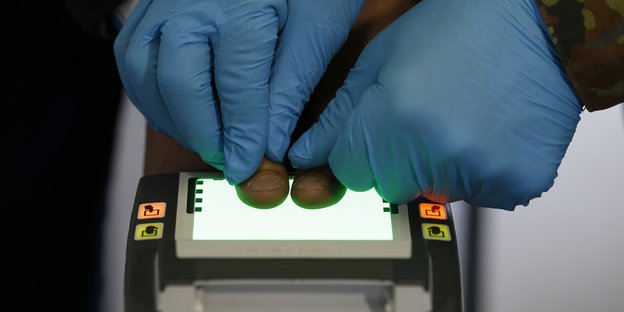EU migration policy in Africa: Transparent Africans
With money and technology from Europe, Africa is biometricised – a joint project for african statehood and EU border guards.

A german civil servant scanning a refugee's fingerprints at an asylum center in Erding Foto: reuters
People fleeing from Africa to Europe have two options: they can take the road across Libya and the Mediterranean Sea, where the mortality rate is around 1:40 this year. Or travel with a borrowed, rented or fake passport.
8,373 people have caught European border guards in 2015 when entering the Schengen area with such travel documents. The dark figure may be higher. In Germany, the quota of asylum procedures „without any identity documents“ was more than 70 percent at the beginning of 2015, according to the number of the Central Register of Aliens (AZR). Missing documents are „still the most quantitatively important problem“ for deportations, states in an evaluation of the federations of the Federal States AG repatriations.
Access to biometrics databases of the African countries of origin is therefore the dream of EU interior ministers. The problem: Many African countries know too little about their own citizens. According to latest figures from the World Bank, some one-third of the population of Africa is not registered by the state at all. Either a list is missing, the last census is decades ago, or the government does not issue identity cards. Or all together.
Because of the lack of digital databases in many of the African offices, folders and registers are piling up in damp cellars. The same goes for the borders: servers, fingerprint scanners, digital cameras, readers are missing. In some places, the data of the expatriates and arrivals are still registered by hand in large notebooks.
An action plan of the EU Commission
This is to change now. Europe has undertaken the biometrics of Africa. In September, the EU Commission announced an „action plan“ for „more solid and intelligent information systems for border management“. When EU leaders met with 30 African presidents on Malta last year, they promised „modern“ reporting registers and „safe“ ID documents. Money from a multi-billion dollar trust fund is expected.

Vor „dramatischer“ Migration aus Afrika warnt die deutsche Regierung, von einem „Marshallplan“ ist die Rede. Doch die Milliardensummen, die Europa in Afrika ausgeben will, dienen nicht nur dem Kampf gegen Armut. Erklärtes Ziel der neuen EU-Afrikapolitik ist es, Flüchtlinge und Migranten schon tief im Innern des Kontintents aufzuhalten. Die taz berichtet seit Mitte November in einem Rechercheschwerpunkt darüber, zu finden unter taz.de/migcontrol.
Die Recherche wurde gefördert von Fleiß und Mut e. V. (cja)
In West Africa, the regional organization Ecowas (West African Economic Community) is just beginning with the introduction of biometric ID cards, which will enable visa-free border crossing in the future. At the same time, the EU is investing 5 million euros in the development of the Wapis police information system. Up to 17 countries between Mauritania and Nigeria will store the fingerprints collected in police investigations centrally and make Interpol accessible.
In Ghana, Mali, Niger and Benin, pilot projects have been running since 2015. The system is also intended for border controls and is intended to help identify fake documents. „This brings a collective comparison of the data of paperless African migrants for deportation purposes within reach“, says Eric Töpfer from the Institute for Human Rights of the taz.
Commissioned Bundesdruckerei
How close, the German Minister of the Interior Thomas de Maizière at the beginning of the year on his Maghreb trip proved. Morocco agreed to a biometric data comparison for deportations, he announced. About two weeks later, Veridos, a joint-stock company of the Bundesdruckerei and the German IT company Giesecke & Devrient, announced that they had been commissioned by Morocco to develop and implement a national border control system. Among other things, biometric scanners, pass-through devices, control sluices and servers for 1,600 checkpoints are delivered.
Moreover, according to the Bundesdruckerei of the taz, it is currently printing raw passports for Libya's transitional government. A delegation from the Sudan Immigration Office paid a visit to her recently.
The market research institute MarketsandMarkets estimates that the global biometry industry will grow by almost 18 percent annually by 2020. Africa is the ideal sales market: the population there is to rise from 1.1 billion to 2.4 billion by the middle of the century, nowhere more people will need passports, passports or driving licenses – the best digital readability.
The UNHCR under pressure
More than a thousand people are currently rescuing daily from southern Sudan to the neighboring countries, mostly Uganda. When they are struck out with their belongings in a refugee camp of the UN refugee agency, they have to give their fingerprints, their photos are stored, and they are given a plastic card on which all the features are stored. Only then do they have the right to protection and access to help.
Over a million refugees, the UNHCR has already registered biometrically with its new registration system (BIMS) worldwide. Your data is stored centrally on a UN database in Geneva, Switzerland. Up to 34 million refugees from 125 countries could be registered here in the future, the Accenture system manufacturer estimates in a promotional brochure. BIMS has already been used in 14 African countries.
The UNHCR is always in conflict with the state authorities. Since Somali Islamists have committed attacks in Kenya, the Kenyan authorities are calling on the UNHCR databases, which contain information about 600,000 refugees in the country, including many Somalis. On taz's request states that the UNHCR „does not share data with states or institutions“.
The fight against terror and irregular migration is increasingly affecting. In Europe it is feared that IS sleeper could have come with the Syrian refugees. As a countermeasure, incoming identity checks are recommended. In line with the EU guidelines, the Sahel states, bombed by Boko Haram and al-Qaeda, want to expand the initial biometrics as an anti-corruption measure.
Europe is happy to help
Many African countries can not afford the expensive printing presses. Europe is happy to help with money and technology. The world market leader in biometrics is the French-Dutch company Gemalto, which operates in four African countries. With an annual turnover of more than € 2 billion, Gemalto supplies a large number of African countries from Algeria to South Africa with biometrics and registered voters, a particularly sensitive issue.
European border protection and African governance policies are thus brought together. „We are cooperating with the African Union on biometrics,“ the EU Commission said. This also involved matters such as the better handling of elections, the registration of children or the establishment of registers of persons. „But of course the data must also be used for migration management.“
In Nigeria, for example. The country is regarded as a high passport of the passport, Nigerians this year the second largest group of irregular migrants from Africa in the EU. Since 2014 the 180 million inhabitants have been equipped with biometric ID cards. The unambiguous identifiability of Nigerian citizens is likely to greatly simplify the implementation of the reintroduction agreement negotiated by the EU with Nigeria. In February 2016, the EU proposed European support for the expansion of the Nigerian registry with biometrics in an internal strategy paper.
So far, only the data of 11 million Nigerians have been recorded; now the Ecowas personnel ID has replaced the original project. It was controversial anyway: the cards should serve as an electronic payment card, with Mastercard as a partner.
Torn deal in Uganda
In other countries too, the contracts between governments and technology groups are a source of controversy because of the high costs and opaque procurement. In Gabon, the opposition to the government's overestimated contract with Gemalto complains. In Uganda, Bavarian technology company Mühlbauer hit the headlines in 2010 when company manager Josef Mühlbauer met with Uganda's President Yoweri Museveni in the middle of the night, accompanied by the German ambassador, to conclude a 64 million Euro biometric ID card. After the Germans until 2012, according to Ugandan data only 400 evasives delivered, the deal blown.
The largest Mühlbauer customer in Africa was until recently Algeria, which was now taken over by Gemalto. „Highly skeptical“ the country is opposed to a return agreement with the EU, states in an internal strategy paper of the EU Commission, the taz is in possession of. Only a quarter of the planned deportations of Algerians in 2014 were actually carried out. The deportees do not want the country, but the biometrics pass. Here the interests reunited. How the EU wants to move more towards Algiers is also in the paper: Brussels wants to leverage money for a „biometric database“.



